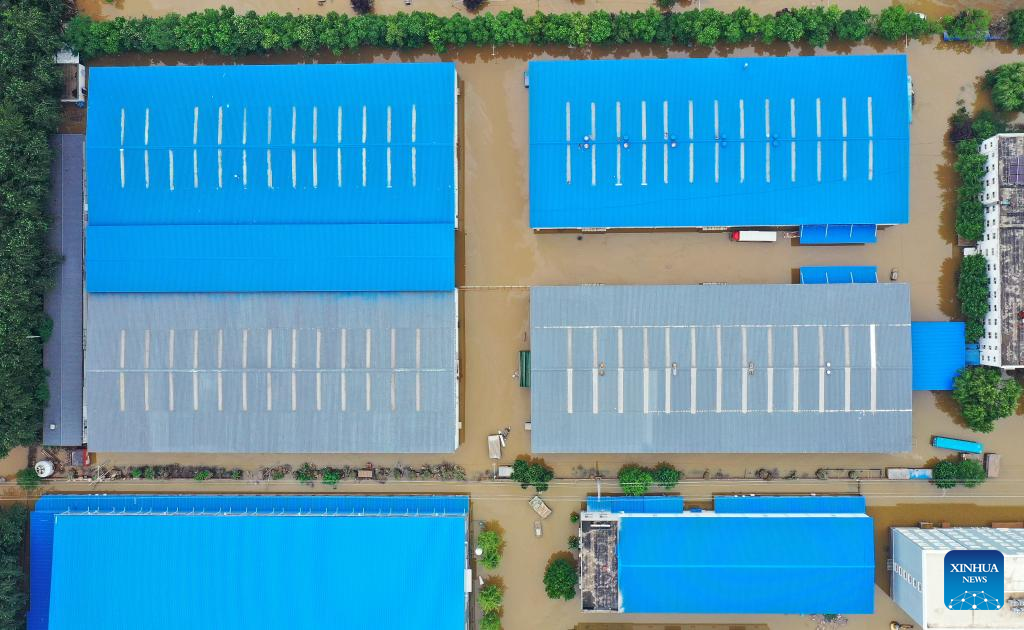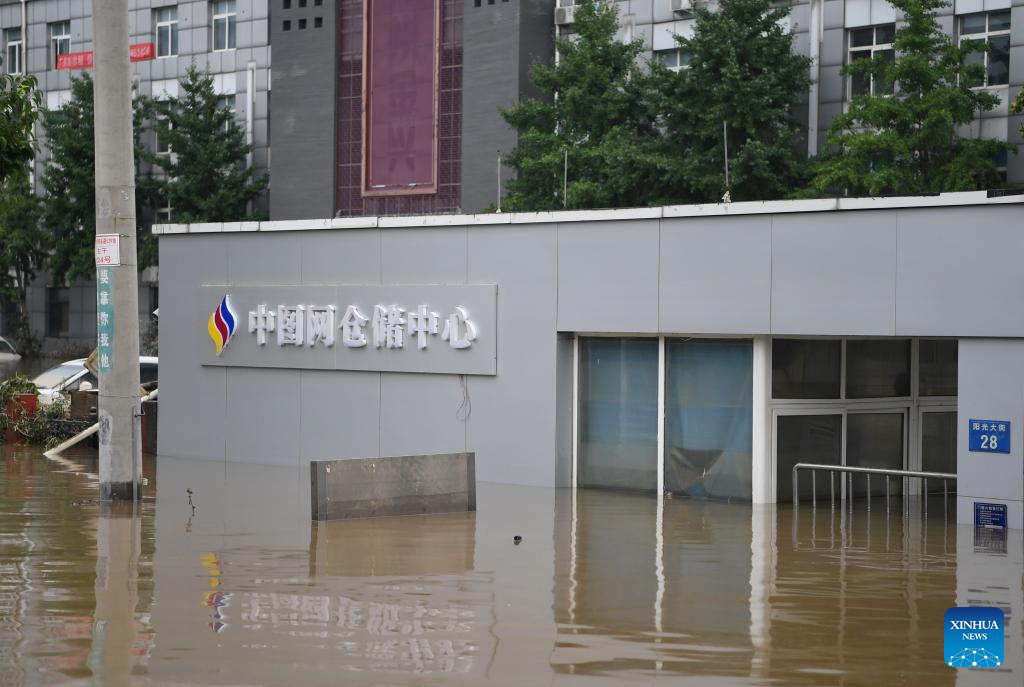Chinese readers salvage flood-damaged books in publishing hub

This aerial photo shows the partially submerged Zhuozhou storage center of Books China, in Zhuozhou City, north China's Hebei Province, Aug. 5, 2023. (Xinhua/Mu Yu)
SHIJIAZHUANG, Aug. 7 (Xinhua) -- For Wei Lintao, Aug. 1 was a long and thrilling day, as her company's warehouse flooded due to the continuous heavy rainfalls caused by Typhoon Doksuri in the Beijing-Tianjin-Hebei region of north China.
Almost all the books which had been with her all the time were submerged in the water.
Wei, a native of Zhuozhou, one of the worst-affected areas in Hebei Province, works as a customer service manager at the Zhuozhou storage center of Books China, one of the earliest online book sales platforms in China.
In 2018, Books China established its warehouse in Zhuozhou, encompassing a space of 20,000 square meters and accommodating over 4 million books.
"At around 2 p.m. on Aug. 1, the floodwater rushed into the warehouse," Wei recalled.
To tackle the torrential rainstorm, the company purchased 2,000 sandbags in advance and prepared flashlights, raincoats and waterproof footwear, among other necessary things. At 10 a.m. that day, Wei and her colleagues swung into action and started piling the sandbags in front of their warehouse.
However, as the floodwater breached the rolling door of the warehouse, it rose much faster than expected. Witnessing the books getting submerged, the staff immediately attempted to carry them upstairs. By around 4:30 p.m., the water had already taken its toll on the valuable collection and their efforts proved futile.
They later sought refuge in a nearby four-story office building, where more than 60 employees and their family members found themselves stranded.
"At that time, essential utilities like drinking water, power and internet service were unavailable, leaving us feeling a bit anxious," Wei said. The floodwater surged beyond the first floor and escalated to a mere seven steps away from reaching the second floor. At its peak, the water level soared to over three meters, creating an alarming situation, she added.
The rescue team arrived at about 11 p.m., and all the trapped people including Wei were evacuated safely the next morning.
"It's heartbreaking to see the loss of so many valuable books," Wei said. Tragically, nearly 80 percent of the warehouse's extensive collection, totaling over 4 million books, was soaked and damaged, leading to an estimated economic loss of nearly 300 million yuan (about 42 million U.S. dollars).
"This is the most devastating loss and a major blow Books China has suffered in the past 25 years," the company said in a statement released on Aug. 2 on its official microblog. "We lost not only money but also those rare, out-of-print, old books that cannot be reproduced."
Books China was not the only company facing challenges due to the flood in Zhuozhou, an important logistics hub for China's publishing industry. The region houses the Beijing southwest logistics center, spanning approximately 26.67 hectares, and serves as a crucial location for the warehouses of nearly 100 publishing houses and dealers.
Following the disaster, numerous publishing enterprises, including Books China, experienced substantial losses, leading them to release statements about delayed shipments. These announcements quickly went viral on social media.
"It's a pity that so many books got soaked, but as long as the people are safe, the books will come back," commented a netizen on the Twitter-like Sina Weibo.
"I bought a lot of books on the platform of Books China previously, which saved my bacon. It's ok. Now it's our turn to save you," wrote another user, as hundreds of thousands of people from the online community expressed support.
A number of book lovers have been keeping an eye on the plight of the publishing companies, and actively offering advice to help with the recovery of the industry. Many of them said they wanted to donate money and were willing to buy the soaked books.
These heartwarming gestures deeply touched people like Wei who are associated with the publishing industry. However, Books China stated that it will not sell the soaked books, as they could potentially harbor dirt and germs, posing a safety risk to the buyers.
As of Aug. 5, the Books China warehouse remained submerged under more than a meter of floodwater. The company is taking gradual steps towards its recovery plan and aims to recoup a portion of its losses through the pre-sale of two "refueling packages" online, each priced at 99 yuan.
One package consists of four books, a metal bookmark and a commemorative badge, and the other one contains cultural and creative products.
"I like reading books, and I am fond of paper books," said Liu Hao, 36, who is engaged in science popularization work.
Upon hearing the distressing news of Zhuozhou's disaster, Liu felt deeply saddened. The avid bookworm wasted no time and immediately placed an order when he came across the "refueling packages" available for sale online.
According to media reports, the overwhelming influx of buyers interested in the "refueling packages" caused such heavy traffic that the Books China website experienced temporary downtime and couldn't be accessed for a while.
On the afternoon of Aug. 4, Huang Ping, founder and CEO of Books China, attended the first live-streaming activity in his life on China's leading e-commerce platform Taobao, promoting books both from his company and his peers.
"I may not be able to sell many books in the first livestream, but I hope all the people in the book industry can stick together," said Huang, adding that his company will offer 10 percent of the sales generated from the "cultural and creative product refueling package" to support other publishing companies to tide over the difficulty.
According to data from Taobao, the two-hour livestream attracted nearly 90,000 viewers, with more than 5,000 "refueling packages" sold.
On the same day, Taobao also launched a special promotional event for the books stockpiled in Zhuozhou, providing crucial support to the affected businesses by helping them reduce their operating costs.
"When the water recedes, we will clean and disinfect the warehouse, and resume production as soon as possible," Wei said, brimming with hope.

This photo shows the partially submerged Zhuozhou storage center of Books China, in Zhuozhou City, north China's Hebei Province, Aug. 5, 2023. (Xinhua/Mu Yu)
Photos
Related Stories
- Local government mobilizes various rescue efforts in flood-stricken Shulan
- Rescuers work around clock in north China's flood-affected Zhuozhou
- China ramps up restoration works in flood-affected northern regions
- Rescuers work around clock in north China's floods-affected Zhuozhou
- Soldiers trek 13 hours to send girl injured in the flood to hospital
Copyright © 2023 People's Daily Online. All Rights Reserved.









